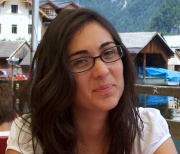October 2024: Dr. Rosella Cappella Zielinski (CAS)
October 2024: Dr. Rosella Cappella Zielinski (CAS)
Dr. Rosella Cappella Zielinski is an associate professor of Political Science at Boston University specializing in the study of political economy of security. Cappella Zielinski teaches classes in International Relations, emphasizing national security. Her courses explore the politics of paying for defense, international conflict, nuclear security (with support from The Stanton Foundation), the relationship between war and society, and a variety of other issues in the field of International Relations. In addition to her academic research, she is committed to promoting the study of political economy of national security. Cappella Zielinski is the founder and Co-Director of Boston University’s Project for the Political Economy of Security.
Her book How States Pay for Wars (Ithaca, NY: Cornell University Press, 2016) won the 2017 American Political Science Association Robert L. Jervis and Paul W. Schroeder Best Book Award in International History and Politics. Her other works can be found in Conflict Management and Peace Science, European Journal of International Relations, Journal of Global Security Studies, Journal of Peace Research, and Security Studies, as well as Foreign Affairs, Texas National Security Review, and War on the Rocks. She is also affiliated with the Costs of War Project.
What made you decide to be a social scientist/ why does social science matter to you?
I wanted to help people, it is that simple. I thought what a better way to help people than understanding political institutions that shape all aspects of our daily lives.
Can you tell us about a recent research project that you’re excited about?
I study warfare – how states economically mobilize for war and how states work together to execute operations on the battlefield. I have a forthcoming book with Oxford University Press titled Wheat at War: Allied Economic Cooperation in World War I. It tells the story of how the allies coordinated wheat and shipping in World War I to ensure their populations were fed and war needs met. The bureaucrats at the center of these institutions would take the lessons learned during World War I and apply them to the League of Nations and the European Coal and Steel Community.
What is the best piece of professional advice you ever received?
My undergrad honor’s thesis advisor told me after I expressed the concern that everything had already been written, that there was only one me and, thus, no one would write what I wrote. It was incredibly freeing.
What is your favorite course you’ve taught at BU?
So many!! I love my undergrad seminar “War and Society.” It explores how war changed over 500 years and how that has affected the relationship between states and their citizens. It really allows students to understand just how deeply war and the mobilization for it has changed society.
Tell us a surprising fact about yourself.
This was my first summer in Boston (after working at BU for a decade). I met my spouse when I started here and was active duty in the military. Thus, I moved wherever he was stationed and commuted to BU. He just retired and we are finally settled and loving it!
